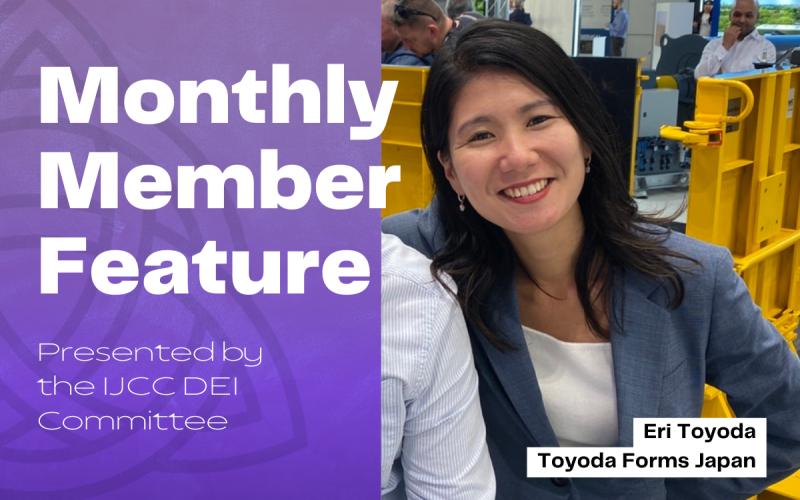DEI Member Feature: Eri Toyoda
Our featured guest for our June DEI interview is Eri Toyoda.
Toyoda-san works for the international sales and marketing department at Toyoda Forms Japan, a family-owned business.
Q1: What is your connection to Ireland and the IJCC?
When I was in high school, I attended an Irish University Festival held in Roppongi where I won the first prize of the raffle which was “One semester studying at Dublin City University including flights”. As I was too young to attend university, I was allowed to change the prize to “Study for free at an English language school” and I attended this language school during the summer of the following year. After graduating high school, I returned to Ireland to study at the Dublin Foundation College, where I was accepted into NUI Galway. Somewhere along the way I fell in love with Ireland and the Irish. In January of this year, I decided to reconnect with Ireland by joining the IJCC.
Q2: How would you define DEI?
Diversity: A mindset that can harmonize in the midst of people from different backgrounds, different values, or any factor that is different.
Equity: A spiritual mindset that feels neither superior nor inferior to others.
Inclusion: When people with different factors are harmonized.
Q3: Would you share an experience where you witnessed a positive impact from DEI.
Toyota Forms Japan makes custom steel molds for precast concrete. We create the molds from design to production and employ over 110 people at our Japanese sites, many of them engineers. Around 6 years ago, Toyoda Forms Japan hired three female design engineers from Myanmar to work at our design department at Tokyo head office. Up until then, all the design engineers were male. The female presence softened the atmosphere of the design engineering department and led to increased motivation as their male colleagues worked hard to support the newcomers from out of the country!
Sometimes diversity can come at a cost to inclusion. But in this case, Myanmar shares a similar spirituality found in Japanese culture, which is a mentality that values harmony with the companies they work for and the people around them more than their own egos and desires. The Myanmarese engineers were respectful of Japanese culture and, through our shared common values, they aligned with Japanese values somewhat easily, bringing an overall positive impact to the organization. This mindset is definitely one of the biggest reasons why DEI with the Myanmarese engineers and us went well.
A very different example of a positive impact of diversity in our organization is when we recently established a factory in India with a staff of about 50 people. We found that the Indian engineering team members are hungrier for growth and improvements in their lifestyles when compared to their Japanese counterparts. Because of this hunger to develop, the Indian engineers reach professional maturity faster and contribute more to the success of the organization earlier in their careers.
Q4. How would you describe DEI in Japan?
From the perspective of integrating non-Japanese nationals, Japan is not very progressive. I often make acquaintance with foreigners who live in Tokyo, and many have said making non-Japanese friends in Tokyo is a lot easier than making local Japanese friends.
From a women-in-business perspective, Japan, in general, still follows the traditional roles of the male breadwinner and female homemaker. Some change is happening as women, like myself, are choosing work as our priority in life.
Q5. What challenges exist for Japanese businesses implementing DEI initiatives. How can they overcome them?
Language.
Japanese learn English from junior high school which is late compared to other countries, and the focus is on reading and writing. Many Japanese are not able to verbally communicate in English even though they are proficient in reading and writing. This definitely impacts Diversity and Inclusion in Japan.
Japanese schools need to find a different approach to teaching English.
Q6. How did living overseas change your views on DEI?
It took a couple of years, but once I could start communicating with people from different countries through English I came to understand that “people are people” regardless of their background. Being able to understand English helped me to understand this.
Final words:
We need a common language to use as a tool to promote diversity and inclusion in Japan.
I would like to see a Japan where Japanese people communicated better in English and where non-Japanese people studied Japanese with a positive attitude. I have noticed a tendency amongst foreign people living in Japan that I made acquaintance with-- due to their work in predominantly English-speaking organizations in Japan, they do not learn Japanese very enthusiastically even though they live in Japan. This also makes it difficult for Japanese people and foreigners to cooperate, integrate and harmonize together in Japanese society. I think efforts from both sides: the effort of Japanese people to learn English more and the effort of foreigners to learn Japanese more, are necessary to see more DEI in Japanese society.

